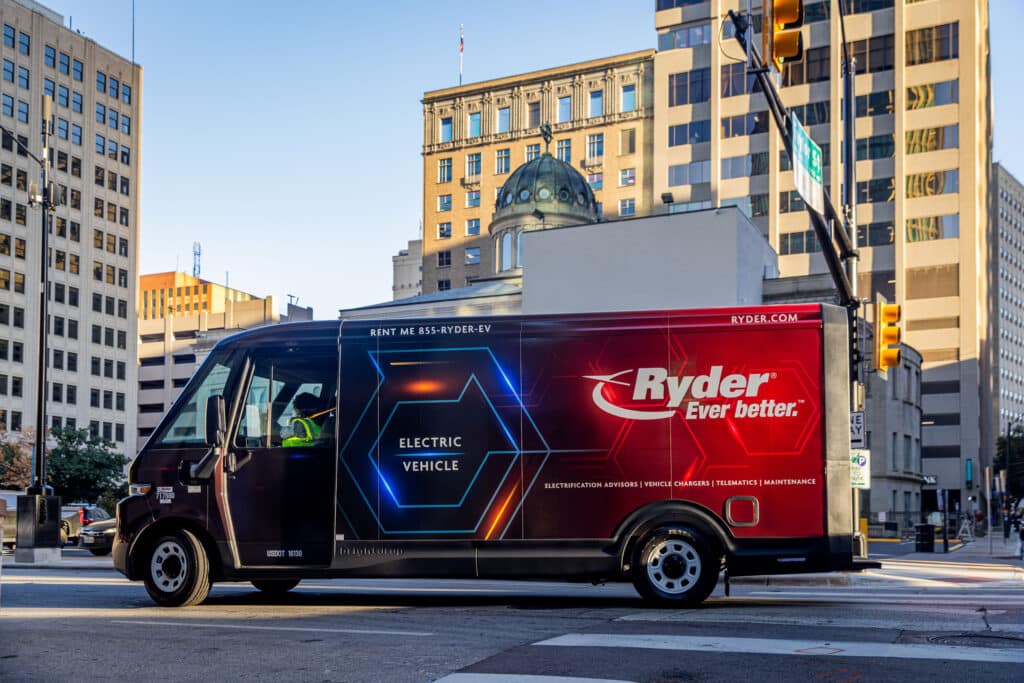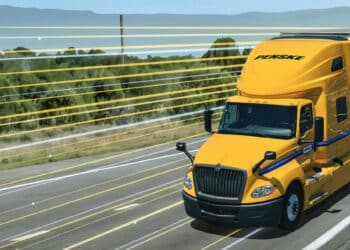Commercial vehicle rental company Ryder System has added two multiyear electric lease customers in South Florida as the commercial equipment industry leans toward leasing to overcome costly barriers to EV adoption.
Ryder expects to expand its light-duty commercial business following the addition of the new RyderElectric+ customers, Angie Hargesheimer, group director of accounts for advanced vehicle technology, told Equipment Finance News.
Light-duty commercial vehicles use cases fit the RyderElectric+ leasing structure. Meanwhile, the company looks to learn from its new clients, Land N’ Sea Distributing and Servientrega International, and apply “those learnings to other customers,” she said.
Ryder is looking to expand its entire EV portfolio, Hargesheimer said.
Pompano Beach, Fla.-based Land N’ Sea and Servientegra, whose U.S. headquarters is in Doral, Fla., will lease BrightDrop Zevo 600s that Ryder added to its fleet in May. BrightDrop is a subsidiary of General Motors. In addition, Land N’ Sea will lease Ford E-Transit vehicles.

Challenges to larger-vehicle EV adoption
While light-duty EVs gain traction, medium-duty and heavy-duty electric vehicles represent an issue for Ryder as the infrastructure for larger EVs is not yet established, Hargesheimer said.
“In medium- and heavy-duty, there are products out there that we still have and can lease all day long,” she said. “We’ve announced Freightliner has products, Navistar has products, and we even have reservations with Tesla, so in that medium- and heavy-duty [space], we’re there and ready. The question is, when is the industry going to be ready? Those vehicles have a significant price tag and the charging has a much higher level of investment that must be made.”
Fleet executives prefer to lease electric vehicles, evidenced by fleet lessor and asset management firm Fleet Advantage’s Industry Benchmarking Survey. In fact, 52% of the 50 top corporate fleet managers in the United States surveyed said they prefer a leasing structure for alternative-fuel vehicles.
Still, EV adoption for equipment and automotive is in a difficult transition period, Brian Holland, president and chief executive of Fleet Advantage, told EFN.
The high cost of ownership and unknown variables such as return on investment and technological capabilities represent key challenges for EV adoption, he said.
“It’s going to be a difficult transition for many, but hopefully one that we’ll be able to navigate,” he said.
About 44% of respondents in Fleet Advantage’s survey indicated they were concerned about both the inability to properly calculate the total cost of ownership and maintaining a strong return on investment.
Truck manufacturers continue to have mixed results when it comes to managing capital; Volta Trucks filed for bankruptcy due to its inability to raise capital following the bankruptcy of the company’s battery supplier Proterra, according to a Volta release. In contrast, Chinese electric truck maker Windrose is preparing to file for a U.S. initial public offering in 2024, following 1,500 combined orders in the United States and China.
For now, determining best use cases will be key to the electrification process, Fleet Advantage’s Holland said.
“With electric vehicles, you’re seeing the push more on automobiles, but heavy-duty trucks will not be far behind, and there are certain applications where electrification makes a lot of sense,” he said. “There are other applications where the infrastructure is challenging, and the costs are challenging.”










